- Home
- Frank Herbert
Dune dc-1 Page 3
Dune dc-1 Read online
Page 3
“They were toys compared to me,” Piter snarled. “You yourself, Baron, could outperform those machines.”
“Perhaps,” the Baron said. “Ah, well….” He took a deep breath, belched. “Now, Piter, outline for my nephew the salient features of our campaign against the House of Atreides. Function as a Mentat for us, if you please.”
“Baron, I’ve warned you not to trust one so young with this information. My observations of—”
“I’ll be the judge of this,” the Baron said. “I give you an order, Mentat. Perform one of your various functions.”
“So be it,” Piter said. He straightened, assuming an odd attitude of dignity—as though it were another mask, but this time clothing his entire body. “In a few days Standard, the entire household of the Duke Leto will embark on a Spacing Guild liner for Arrakis. The Guild will deposit them at the city of Arrakeen rather than at our city of Carthag. The Duke’s Mentat, Thufir Hawat, will have concluded rightly that Arrakeen is easier to defend.”
“Listen carefully, Feyd,” the Baron said. “Observe the plans within plans within plans.”
Feyd-Rautha nodded, thinking: This is more like it. The old monster is letting me in on secret things at last. He must really mean for me to be his heir.
“There are several tangential possibilities,” Piter said. “I indicate that House Atreides will go to Arrakis. We must not, however, ignore the possibility the Duke has contracted with the Guild to remove him to a place of safety outside the System. Others in like circumstances have become renegade Houses, taking family atomics and shields and fleeing beyond the Imperium.”
“The Duke’s too proud a man for that,” the Baron said.
“It is a possibility,” Piter said. “The ultimate effect for us would be the same, however.”
“No, it would not!” the Baron growled. “I must have him dead and his line ended.”
“That’s the high probability,” Piter said. “There are certain preparations that indicate when a House is going renegade. The Duke appears to be doing none of these things.”
“So,” the Baron sighed. “Get on with it, Piter.
“At Arrakeen,” Piter said, “the Duke and his family will occupy the Residency, lately the home of Count and Lady Fenring.”
“The Ambassador to the Smugglers,” the Baron chuckled.
“Ambassador to what?” Feyd-Rautha asked.
“Your uncle makes a joke,” Piter said. “He calls Count Fenring Ambassador to the Smugglers, indicating the Emperor’s interest in smuggling operations on Arrakis.”
Feyd-Rautha turned a puzzled stare on his uncle. “Why?”
“Don’t be dense, Feyd,” the Baron snapped. “As long as the Guild remains effectively outside Imperial control, how could it be otherwise? How else could spies and assassins move about?”
Feyd-Rautha’s mouth made a soundless “Oh-h-h-h.”
“We’ve arranged diversions at the Residency,” Piter said. “There’ll be an attempt on the life of the Atreides heir—an attempt which could succeed.”
“Piter,” the Baron rumbled, “you indicated—”
“I indicated accidents can happen,” Piter said. “And the attempt must appear valid.”
“Ah, but the lad has such a sweet young body,” the Baron said. “Of course, he’s potentially more dangerous than the father … with that witch mother training him. Accursed woman! Ah, well, please continue, Piter.”
“Hawat will have divined that we have an agent planted on him,” Piter said. “The obvious suspect is Dr. Yueh, who is indeed our agent. But Hawat has investigated and found that our doctor is a Suk School graduate with Imperial Conditioning—supposedly safe enough to minister even to the Emperor. Great store is set on Imperial Conditioning. It’s assumed that ultimate conditioning cannot be removed without killing the subject. However, as someone once observed, given the right lever you can move a planet. We found the lever that moved the doctor.”
“How?” Feyd-Rautha asked. He found this a fascinating subject. Everyone knew you couldn’t subvert Imperial Conditioning!
“Another time,” the Baron said. “Continue, Piter.”
“In place of Yueh,” Piter said, “we’ll drag a most interesting suspect across Hawat’s path. The very audacity of this suspect will recommend her to Hawat’s attention.”
“Her?” Feyd-Rautha asked.
“The Lady Jessica herself,” the Baron said.
“Is it not sublime?” Piter asked. “Hawat’s mind will be so filled with this prospect it’ll impair his function as a Mentat. He may even try to kill her.” Piter frowned, then: “But I don’t think he’ll be able to carry it off.”
“You don’t want him to, eh?” the Baron asked.
“Don’t distract me,” Piter said. “While Hawat’s occupied with the Lady Jessica, we’ll divert him further with uprisings in a few garrison towns and the like. These will be put down. The Duke must believe he’s gaining a measure of security. Then, when the moment is ripe, we’ll signal Yueh and move in with our major force … ah….”
“Go ahead, tell him all of it,” the Baron said.
“We’ll move in strengthened by two legions of Sardaukar disguised in Harkonnen livery.”
“Sardaukar!” Feyd-Rautha breathed. His mind focused on the dread Imperial troops, the killers without mercy, the soldier-fanatics of the Padishah Emperor.
“You see how I trust you, Feyd,” the Baron said. “No hint of this must ever reach another Great House, else the Landsraad might unite against the Imperial House and there’d be chaos.”
“The main point,” Piter said, “is this: since House Harkonnen is being used to do the Imperial dirty work, we’ve gained a true advantage. It’s a dangerous advantage, to be sure, but if used cautiously, will bring House Harkonnen greater wealth than that of any other House in the Imperium.”
“You have no idea how much wealth is involved, Feyd,” the Baron said. “Not in your wildest imaginings. To begin, we’ll have an irrevocable directorship in the CHOAM Company.”
Feyd-Rautha nodded. Wealth was the thing. CHOAM was the key to wealth, each noble House dipping from the company’s coffers whatever it could under the power of the directorships. Those CHOAM directorships—they were the real evidence of political power in the Imperium, passing with the shifts of voting strength within the Landsraad as it balanced itself against the Emperor and his supporters.
“The Duke Leto,” Piter said, “may attempt to flee to the new Fremen scum along the desert’s edge. Or he may try to send his family into that imagined security. But that path is blocked by one of His Majesty’s agents—the planetary ecologist. You may remember him—Kynes.”
“Feyd remembers him,” the Baron said. “Get on with it.”
“You do not drool very prettily, Baron,” Piter said.
“Get on with it, I command you!” the Baron roared.
Piter shrugged. “If matters go as planned,” he said, “House Harkonnen will have a subfief on Arrakis within a Standard year. Your uncle will have dispensation of that fief. His own personal agent will rule on Arrakis.”
“More profits,” Feyd-Rautha said.
“Indeed,” the Baron said. And he thought: It’s only just. We’re the ones who tamed Arrakis … except for the few mongrel Fremen hiding in the skirts of the desert … and some tame smugglers bound to the planet almost as tightly as the native laborpool.
“And the Great Houses will know that the Baron has destroyed the Atreides,” Piter said. “They will know.”
“They will know,” the Baron breathed.
“Loveliest of all,” Piter said, “is that the Duke will know, too. He knows now. He can already feel the trap.”
“It’s true the Duke knows,” the Baron said, and his voice held a note of sadness. “He could not help but know … more’s the pity.”
The Baron moved out and away from the globe of Arrakis. As he emerged from the shadows, his figure took on dimension—grossly and immensely fat. And
with subtle bulges beneath folds of his dark robes to reveal that all this fat was sustained partly by portable suspensors harnessed to his flesh. He might weigh two hundred Standard kilos in actuality, but his feet would carry no more than fifty of them.
“I am hungry,” the Baron rumbled, and he rubbed his protruding lips with a beringed hand, stared down at Feyd-Rautha through fat-enfolded eyes. “Send for food, my darling. We will eat before we retire.”
***
Thus spoke St. Alia-of-the-Knife: “The Reverend Mother must combine the seductive wiles of acourtesan with the untouchable majesty of a virgin goddess, holding these attributes in tension so long as the powers of her youth endure. For when youth and beauty have gone, she will find that the place-between, once occupied by tension, has become a well-spring of cunning and resourcefulness.”
—from“Muad’Dib, Family Commentaries” by the Princess Irulan
“WELL, JESSICA, what have you to say for yourself?” asked the Reverend Mother.
It was near sunset at Castle Caladan on the day of Paul’s ordeal. The two women were alone in Jessica’s morning room while Paul waited in the adjoining soundproofed Meditation Chamber.
Jessica stood facing the south windows. She saw and yet did not see the evening’s banked colors across meadow and river. She heard and yet did not hear the Reverend Mother’s question.
There had been another ordeal once—so many years ago. A skinny girl with hair the color of bronze, her body tortured by the winds of puberty, had entered the study of the Reverend Mother Gaius Helen Mohiam, Proctor Superior of the Bene Gesserit school on Wallach IX. Jessica looked down at her right hand, flexed the fingers, remembering the pain, the terror, the anger.
“Poor Paul,” she whispered.
“I asked you a question, Jessica!” The old woman’s voice was snappish, demanding.
“What? Oh….” Jessica tore her attention away from the past, faced the Reverend Mother, who sat with back to the stone wall between the two west windows. “What do you want me to say?”
“What do I want you to say? What do I want you to say?” The old voice carried a tone of cruel mimicry.
“So I had a son!” Jessica flared. And she knew she was being goaded into this anger deliberately.
“You were told to bear only daughters to the Atreides.”
“It meant so much to him,” Jessica pleaded.
“And you in your pride thought you could produce the Kwisatz Haderach!”
Jessica lifted her chin. “I sensed the possibility.”
“You thought only of your Duke’s desire for a son,” the old woman snapped. “And his desires don’t figure in this. An Atreides daughter could’ve been wed to a Harkonnen heir and sealed the breach. You’ve hopelessly complicated matters. We may lose both bloodlines now.”
“You’re not infallible,” Jessica said. She braved the steady stare from the old eyes.
Presently, the old woman muttered: “What’s done is done.”
“I vowed never to regret my decision,” Jessica said.
“How noble,” the Reverend Mother sneered. “No regrets. We shall see when you’re a fugitive with a price on your head and every man’s hand turned against you to seek your life and the life of your son.”
Jessica paled. “Is there no alternative?”
“Alternative? A Bene Gesserit should ask that?”
“I ask only what you see in the future with your superior abilities.”
“I see in the future what I’ve seen in the past. You well know the pattern of our affairs, Jessica. The race knows its own mortality and fears stagnation of its heredity. It’s in the bloodstream—the urge to mingle genetic strains without plan. The Imperium, the CHOAM Company, all the Great Houses, they are but bits of flotsam in the path of the flood.”
“CHOAM,” Jessica muttered. “I suppose it’s already decided how they’ll redivide the spoils of Arrakis.”
“What is CHOAM but the weather vane of our times,” the old woman said. “The Emperor and his friends now command fifty-nine point six-five per cent of the CHOAM directorship’s votes. Certainly they smell profits, and likely as others smell those same profits his voting strength will increase. This is the pattern of history, girl.”
“That’s certainly what I need right now,” Jessica said. “A review of history.”
“Don’t be facetious, girl! You know as well as I do what forces surround us. We’ve a three-point civilization: the Imperial Household balanced against the Federated Great Houses of the Landsraad, and between them, the Guild with its damnable monopoly on interstellar transport. In politics, the tripod is the most unstable of all structures. It’d be bad enough without the complication of a feudal trade culture which turns its back on most science.”
Jessica spoke bitterly: “Chips in the path of the flood—and this chip here, this is the Duke Leto, and this one’s his son, and this one’s—”
“Oh, shut up, girl. You entered this with full knowledge of the delicate edge you walked.”
“ ‘I am Bene Gesserit: I exist only to serve,’ ” Jessica quoted.
“Truth,” the old woman said. “And all we can hope for now is to prevent this from erupting into general conflagration, to salvage what we can of the key bloodlines.”
Jessica closed her eyes, feeling tears press out beneath the lids. She fought down the inner trembling, the outer trembling, the uneven breathing, the ragged pulse, the sweating of the palms. Presently, she said, “I’ll pay for my own mistake.”
“And your son will pay with you.”
“I’ll shield him as well as I’m able.”
“Shield!” the old woman snapped. “You well know the weakness there! Shield your son too much, Jessica, and he’ll not grow strong enough to fulfill any destiny.”
Jessica turned away, looked out the window at the gathering darkness. “Is it really that terrible, this planet of Arrakis?”
“Bad enough, but not all bad. The Missionaria Protectiva has been in there and softened it up somewhat.” The Reverend Mother heaved herself to her feet, straightened a fold in her gown. “Call the boy in here. I must be leaving soon.”
“Must you?”
The old woman’s voice softened. “Jessica, girl, I wish I could stand in your place and take your sufferings. But each of us must make her own path.”
“I know.”
“You’re as dear to me as any of my own daughters, but I cannot let that interfere with duty.”
“I understand … the necessity.”
“What you did, Jessica, and why you did it—we both know. But kindness forces me to tell you there’s little chance your lad will be the Bene Gesserit Totality. You mustn’t let yourself hope too much.”
Jessica shook tears from the corners of her eyes. It was an angry gesture. “You make me feel like a little girl again—reciting my first lesson.” She forced the words out: “ ‘Humans must never submit to animals.’ ” A dry sob shook her. In a low voice, she said: “I’ve been so lonely.”
“It should be one of the tests,” the old woman said. “Humans are almost always lonely. Now summon the boy. He’s had a long, frightening day. But he’s had time to think and remember, and I must ask the other questions about these dreams of his.”
Jessica nodded, went to the door of the Meditation Chamber, opened it. “Paul, come in now, please.”
Paul emerged with a stubborn slowness. He stared at his mother as though she were a stranger. Wariness veiled his eyes when he glanced at the Reverend Mother, but this time he nodded to her, the nod one gives an equal. He heard his mother close the door behind him.
“Young man,” the old woman said, “let’s return to this dream business.”
“What do you want?”
“Do you dream every night?”
“Not dreams worth remembering. I can remember every dream, but some are worth remembering and some aren’t.”
“How do you know the difference?”
“I just know it.”
/>
The old woman glanced at Jessica, back to Paul. “What did you dream last night? Was it worth remembering?”
“Yes.” Paul closed his eyes. “I dreamed a cavern … and water … and a girl there—very skinny with big eyes. Her eyes are all blue, no whites in them. I talk to her and tell her about you, about seeing the Reverend Mother on Caladan.” Paul opened his eyes.
“And the thing you tell this strange girl about seeing me, did it happen today?”
Paul thought about this, then: “Yes. I tell the girl you came and put a stamp of strangeness on me.”
“Stamp of strangeness,” the old woman breathed, and again she shot a glance at Jessica, returned her attention to Paul. “Tell me truly now, Paul, do you often have dreams of things that happen afterward exactly as you dreamed them?”
“Yes. And I’ve dreamed about that girl before.”
“Oh? You know her?”
“I will know her.”
“Tell me about her.”
Again, Paul closed his eyes. “We’re in a little place in some rocks where it’s sheltered. It’s almost night, but it’s hot and I can see patches of sand out of an opening in the rocks. We’re… waiting for something … for me to go meet some people. And she’s frightened but trying to hide it from me, and I’m excited. And she says: ‘Tell me about the waters of your homeworld, Usul.’ ” Paul opened his eyes. “Isn’t that strange? My homeworld’s Caladan. I’ve never even heard of a planet called Usul.”
“Is there more to this dream?” Jessica prompted.
“Yes. But maybe she was calling me Usul,” Paul said. “I just thought of that.” Again, he closed his eyes. “She asks me to tell her about the waters. And I take her hand. And I say I’ll tell her a poem. And I tell her the poem, but I have to explain some of the words—like beach and surf and seaweed and seagulls.”
“What poem?” the Reverend Mother asked.

 Direct Descent
Direct Descent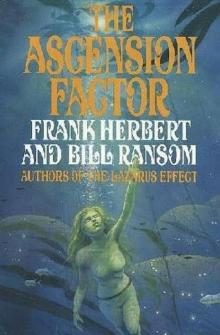 The Ascension Factor
The Ascension Factor The Heaven Makers
The Heaven Makers Children of Dune
Children of Dune Old Rambling House
Old Rambling House Dune
Dune The Worlds of Frank Herbert
The Worlds of Frank Herbert The Jesus Incident
The Jesus Incident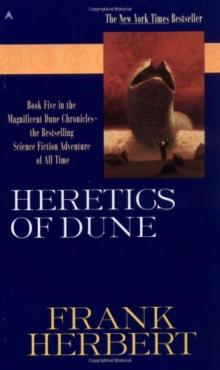 Heretics of Dune
Heretics of Dune Whipping Star
Whipping Star Dune Messiah
Dune Messiah Man of Two Worlds
Man of Two Worlds The Book of Frank Herbert
The Book of Frank Herbert Hunters Of Dune
Hunters Of Dune The Tactful Saboteur
The Tactful Saboteur Soul Catcher
Soul Catcher God Emperor of Dune
God Emperor of Dune The White Plague
The White Plague The Green Brain
The Green Brain The Godmakers
The Godmakers Sandworms of Dune
Sandworms of Dune Destination Void
Destination Void The Dosadi Experiment
The Dosadi Experiment Eye
Eye High-Opp
High-Opp The Eyes of Heisenberg
The Eyes of Heisenberg Missing Link
Missing Link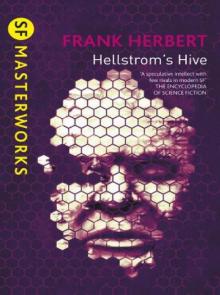 Hellstrom's Hive
Hellstrom's Hive Chapterhouse: Dune
Chapterhouse: Dune The Santaroga Barrier
The Santaroga Barrier The Dragon in the Sea
The Dragon in the Sea Operation Haystack
Operation Haystack A Thorn in the Bush
A Thorn in the Bush Four Unpublished Novels
Four Unpublished Novels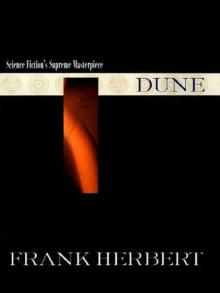 Dune dc-1
Dune dc-1 Jorj X. McKie 1 - Whipping Star
Jorj X. McKie 1 - Whipping Star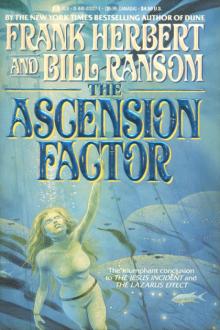 DV 4 - The Ascension Factor
DV 4 - The Ascension Factor Frank Herbert - Dune Book 4 - God Emperor Of Dune
Frank Herbert - Dune Book 4 - God Emperor Of Dune ChapterHouse: Dune dc-6
ChapterHouse: Dune dc-6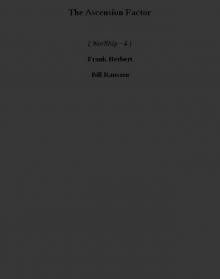 The Ascension Factor w-4
The Ascension Factor w-4 A Game of Authors
A Game of Authors Children of Dune dc-3
Children of Dune dc-3 Destination: Void: Prequel to the Pandora Sequence
Destination: Void: Prequel to the Pandora Sequence The Collected Stories of Frank Herbert
The Collected Stories of Frank Herbert Dune Messiah dc-2
Dune Messiah dc-2 Frank Herbert - Dune Book 5 - Heretics of Dune
Frank Herbert - Dune Book 5 - Heretics of Dune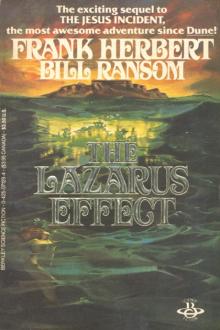 DV 3 - The Lazarus Effect
DV 3 - The Lazarus Effect The Jesus Incident w-2
The Jesus Incident w-2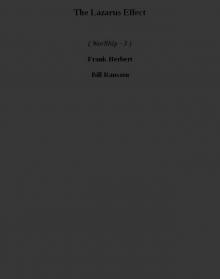 The Lazarus Effect w-3
The Lazarus Effect w-3 Frank Herbert
Frank Herbert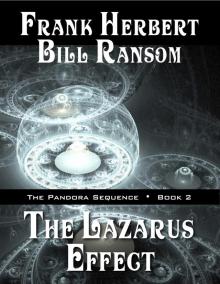 The Ascension Factor: Pandora Sequence
The Ascension Factor: Pandora Sequence Dune (40th Anniversary Edition)
Dune (40th Anniversary Edition)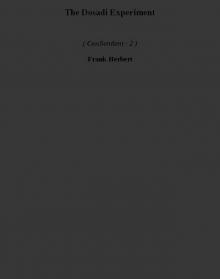 The Dosadi Experiment c-2
The Dosadi Experiment c-2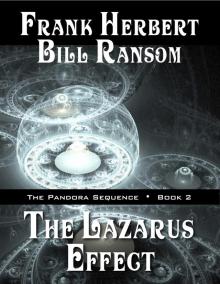 The Lazarus Effect
The Lazarus Effect God Emperor of Dune dc-4
God Emperor of Dune dc-4 The Pandora Sequence: The Jesus Incident, the Lazarus Effect, the Ascension Factor
The Pandora Sequence: The Jesus Incident, the Lazarus Effect, the Ascension Factor The Green Brain (v4.0)
The Green Brain (v4.0) The Heaven Makers (v4.0)
The Heaven Makers (v4.0) Heretics of Dune dc-5
Heretics of Dune dc-5